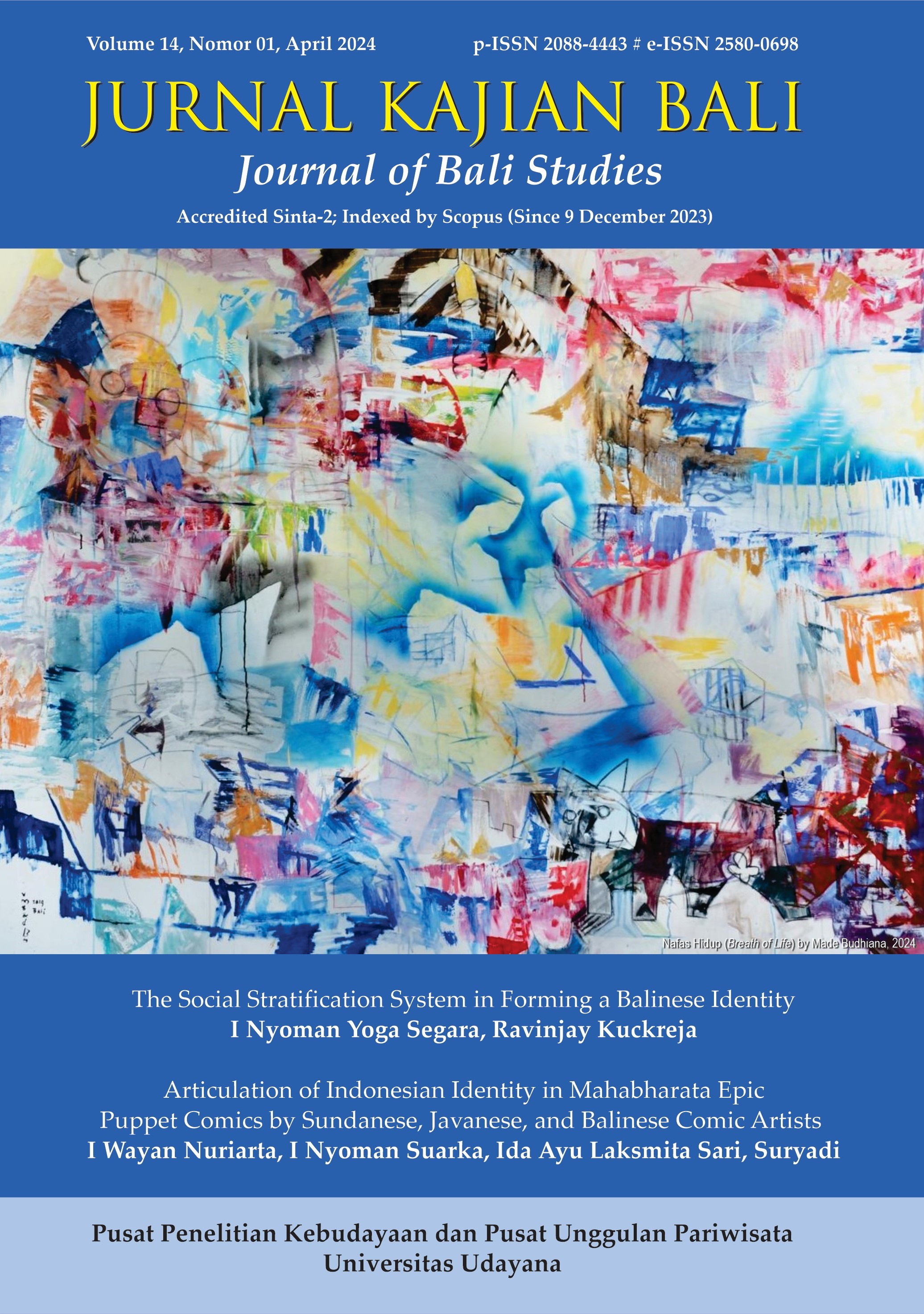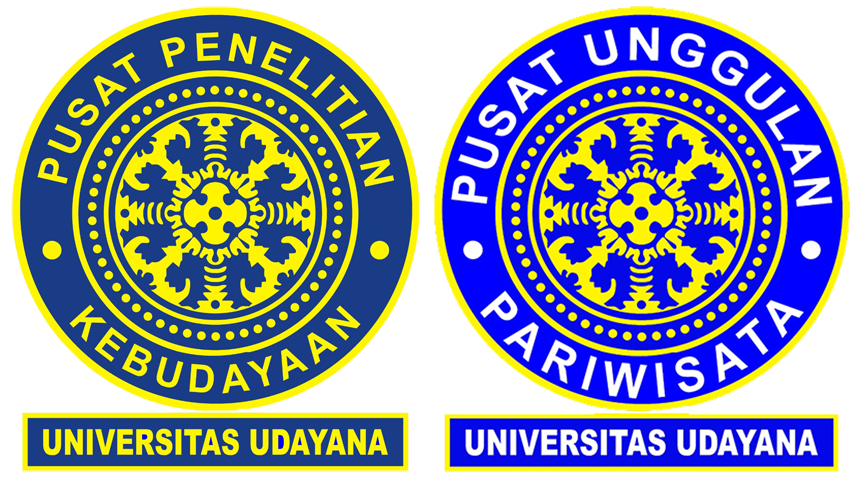Enhancing Cultural Heritage Tourism Through a Spiritual Knowledge: The Implementation of Tri Hita Karana in Taro Village Gianyar Bali
Abstract
Spiritual knowledge has been found significant in environmental conservation, yet its role in developing tourism is under-researched. This study aims to explore the potential of spiritual knowledge and how it is being implemented in rural tourism practices. Tri Hita Karana becomes an underpinning spiritual knowledge under this study enquiry, with Taro village was the case study. Taro reflects the community’s spiritual wisdom in their destination management. Data was collected through direct interviews with 7 key informants and observations to 3 sites. Findings showed that the implementation of Tri Hita Karana was found significant in designing three temples as tourist attractions. The implementations were identified in introducing socio-cultural functions (pawongan), maintaining spiritual uniqueness (parahyangan), and sustaining sacred architecture landscape (palemahan). The present study contributes to the cultural heritage management by emphasising spiritual knowledge in designing cultural heritage attractions. The findings can practically suggest incorporating spiritual knowledge in the heritage tourism management.
Downloads
References
Adityanandana, M., & Gerber, J.-F. (2019). Post-growth in the Tropics? Contestations over Tri Hita Karana and a tourism megaproject in Bali. Journal of Sustainable Tourism, 27(12), 1839–1856. https://doi.org/10.1080/09669582.2019.1666857
Ardika, I.W. 2007. Pusaka Budaya dan Pariwisata. Denpasar: Pusaka Larasan.
Arida, I. N. S., Sukma, N., & Sukma, N. (2017). Kajian penyusunan kriteria-kriteria desa wisata sebagai instrumen dasar pengembangan desa wisata. Jurnal Analisis Pariwisata, issn, 1410-3729.
Arthayasa, P. (2014). Pengembangan Pariwisata Gianyar Berbasis Budaya. Antara Bali.
Barker, C. (2008). Cultural Studies; Teori and Praktik. Kreasi Wacana, Yogyakarta.
Braun, V., & Clarke, V. (2006). Using thematic analysis in psychology. Qualitative Research in Psychology, 3(2), 77–101. https://doi.org/10.1191/1478088706qp063oa
Buckley, R. C., Guitart, D., & Shakeela, A. (2017). Contested surf tourism resources in the Maldives. Annals of Tourism Research, 64, 185–199. https://doi.org/10.1016/j.annals.2017.03.005
Chen, X. (2017). A phenomenological explication of guanxi in rural tourism management: A case study of a village in China. Tourism Management, 63, 383–394. https://doi.org/https://doi.org/10.1016/j.tourman.2017.07.001
Denzin, N. K., & Lincoln, Y. S. (Eds.). (2018). The SAGE Handbook of Qualitative Research (5th ed.). Los Angeles, CA: Sage.
de Souza Bispo, M. (2016). Tourism as practice. Annals of Tourism Research, 61, 170–179. https://doi.org/10.1016/j.annals.2016.10.009
Grenfell, M. (2010). Working with habitus and field: The logic of Bourdieu’s practice. In Cultural analysis and Bourdieu’s Legacy. Routledge.
Hanik, Umi. (2022). Integrasi Hadis dan Ilmu Sosial. Surabaya: CV. Global Aksara Pers
Harker, R., Mahar, C., & Wilkes, C. (2016). An introduction to the work of Pierre Bourdieu: The practice of theory. Springer.
Herindiyah, L. K., Yuni, K., Harry, J., & Suarthana, P. (2018). Local Communities Involvement in the Development of Taro Tourism Village, Gianyar. Journal of Social Sciences and Humanities, 3. V. 8, N. 3, pp. 260-270, DOI: http://dx.doi.org/10.31940/soshum.v8i3.1082
Ho, P. S. Y., & McKercher, B. (2004). Managing heritage resources as tourism products. Asia Pacific Journal of Tourism Research, 9(3), 255–266. https://doi.org/10.1080/1094166042000290655
Larson, L. R., & Poudyal, N. C. (2012). Developing sustainable tourism through adaptive resource management: A case study of Machu Picchu, Peru. Journal of Sustainable Tourism, 20(7), 917–938. https://doi.org/10.1080/09669582.2012.667217
Lincoln, Norman K Denzin Yvonna S. (2009). Hand Book Of Qualitative Reseach. Pertama. Yogyakarta: Pustaka Pelajar.
Lizardo, O. (2004). The Cognitive Origins of Bourdieu’s Habitus. Journal for the theory of social behaviour, 34(4), 375-401. https://doi.org/10.1111/j.1468-5914.2004.00255.x
MacRae, G. (2011). Rice farming in Bali. Critical Asian Studies, 43(1), 69–92. https://doi.org/10.1080/14672715.2011.537852
McKercher, B., Ho, P. S. Y., & du Cros, H. (2005). Relationship between tourism and cultural heritage management: Evidence from Hong Kong. Tourism Management, 26(4), 539–548. https://doi.org/10.1016/j.tourman.2004.02.018
Murti, D. C. W. (2020). Performing rural heritage for nation branding: a comparative study of Japan and Indonesia. Journal of Heritage Tourism, 15(2), 127–148. https://doi.org/10.1080/1743873X.2019.1617720
Nur, F., & Harianto, S. (2023). Peranan Modal Sosial Dalam Praktik Lamaran Masyarakat Desa Sumberbendo Kecamatan Mantp Kabupaten Lamongan. Paradigma, 12(3), 191-200.
Nuruddin, N., Wirawan, P. E., Pujiastuti, S., & Sri Astuti, N. N. (2020). Strategi Bertahan Hotel di Bali Saat Pandemi Covid-19. Jurnal Kajian Bali (Journal of Bali Studies), 10(2), 579. https://doi.org/10.24843/jkb.2020.v10.i02.p11
Reid, D. (2002). Development of Cultural Tourism in Africa: a Community Based Approach. Association for Tourism and Leisure Education (ATLAS).
Rutte, C. (2011). The sacred commons: Conflicts and solutions of resource management in sacred natural sites. Biological Conservation, 144(10), 2387–2394. https://doi.org/10.1016/j.biocon.2011.06.017
Partama, I.B.G and Putri, B.R.T. (2015). Lembu Putih Taro Maskot Kabupaten Gianyar. Denpasar: Udayana University Press.
Peraturan Daerah. (2013). Peraturan Daerah Kabupaten Gianyar Tentang Kepariwisataan Budaya Kabupaten Gianyar. Kabupaten Gianyar
Pastika, I. W., Adhana, I. K., Dibia, I. W., Geriya, I. W., Raka, A. A. G., & Anom, I. (2015). Branding Kabupaten Gianyar Representasi Identitas Kabupaten Seni dan Kabupaten Pusaka di Tengah Komunikasi Lokal, Nasional dan Internasional. Pustaka Larasan.
Pujaastawa, I. B. G., & Suwena, W. (2013). Kearifan Lokal Di Balik Mitos Lembu Putih Di Desa Taro, Gianyar. Jurnal Bumi Lestari,13(2): 430–440
Richards, G. (1999). Culture, cultural tourism and identity. Tilburg University, The Netherlands. Conference on Sustainable Tourism Development in the Wadden Sea Region, Stade, Germany.
Rosalina, P. D., Dupre, K., Wang, Y., Putra, I. N. D., & Jin, X. (2023). Rural tourism resource management strategies: A case study of two tourism villages in Bali. Tourism Management Perspectives, 49. https://doi.org/10.1016/j.tmp.2023.101194
Rosalina, P. D., Wang, Y., Dupre, K., Putra, I. N. D., & Jin, X. (2023). Rural tourism in Bali: towards a conflict-based tourism resource typology and management. Tourism Recreation Research. https://doi.org/10.1080/02508281.2023.2223076
Saskariana, I. W. (2016). Penerapan Tri Hita Karana dalam Pengelolaan Taman Wisata Lembu Putih, Desa Taro Kabupaten Gianyar. Program Studi S1 Destinasi Pariwisata, Fakultas Pariwisata, Universitas Udayana, Denpasar.
Sharpley, R. (2016). Tourism and Spirituality: An Evolving Relationship. International Journal of Tourism and Spirituality. https://doi.org/10.22133/ijts.2016.43074
Shepherd, R. (2002). Commodification, Culture and Tourism. Tourist Studies, 2(2), 183–201. https://doi.org/10.1177/146879702761936653
Siisiainen, M. (2003). Two concepts of social capital: Bourdieu vs. Putnam. International journal of contemporary sociology, 40(2), 183-204.
Sotomayor, S., Gil Arroyo, C., & Barbieri, C. (2019). Tradition and modernity side-by-side: experiential tourism among Quechua communities. Journal of Tourism and Cultural Change, 17(4), 377–393. https://doi.org/10.1080/14766825.2019.1591683
Strauss, S. (2015). Alliances Across Ideologies: Networking with NGOs in a Tourism Dispute in Northern Bali. Asia Pacific Journal of Anthropology, 16(2), 123–140. https://doi.org/10.1080/14442213.2014.1001996
Strickland-Munro, J., & Moore, S. (2013). Indigenous involvement and benefits from tourism in protected areas: A study of Purnululu National Park and Warmun Community, Australia. Journal of Sustainable Tourism, 21(1), 26–41. https://doi.org/10.1080/09669582.2012.680466
Sun, W., Chien, P. M., Ritchie, B. W., & Pappu, R. (2022). When compatriot tourists behave badly: The impact of misbehavior appraisal and outgroup criticism construal. Journal of Destination Marketing and Management, 23(February), 100695. https://doi.org/10.1016/j.jdmm.2022.100695
Sunaryo, B. (2013). Kebijakan pembangunan destinasi pariwisata: konsep dan aplikasinya di Indonesia. Gava Media.
Surat Keputusan. No. 429/ E-02/HK/2017. (2017). Keputusan Bupati Gianyar Tentang Penetapan Desa Wisata di Kabupaten Gianyar, Pub. L. No. No. 429/ E-02/HK/2017. Kabupaten Gianyar.
Suter, W. N. (2012). Introduction to Educational Research: A Critical Thinking Approach. SAGE Publications.
Wardana, A. (2019). Contemporary Bali: Contested Space and Governance. In Contemporary Bali: Contested Space and Governance. https://doi.org/10.1007/978-981-13-2478-9
Widiastuti. (2018). Ketahanan Budaya Masyarakat Bali Aga dalam Menciptakan Desa Wisata yang Berkelanjutan. Jurnal Kajian Bali (Journal of Bali Studies), 08(1), 93–120. https://doi.org/10.24843/JKB.2018.v08.i01.p06.
Wijaya, I. M. (2020). Strategi Pengembangan Masyarakat Dalam Pengembangan Daya tarik wisata Berbasis Adat. Universitas Mahasaraswati.
Wijaya, N. S., Sudarmawan, I. W. E., & Sukaarnawa, I. G. M. (2021). Community Base Tourism Untuk Menunjang Pariwisata Berkelanjutan Di Kawasan Desa Wisata Taro, Tegallalang, Gianyar Bali. Jurnal Ilmiah Hospitality Management, 11(2), 90–100. https://doi.org/https://dx.doi.org/10.22334/jihm.v11i2
Wirawan, P. E., Sunarta, I. N., Anom, I. P., & Sudiarta, I. N. (2023). Spiritual Tourism Development Strategy at Taro Tourism Village, Gianyar, Bali. Journal of Southwest Jiaotong University, 58(1). https://doi.org/10.35741/issn.0258-2724.58.1.76
Wirawan, P. E., Supartini, N. L., & Sudiana, I. M. (2022). Moringa Leaf-Based Gastronomic Tourism in Taro Village, Gianyar, Bali. International Journal of Social Science and Business, 6(4). https://doi.org/10.23887/ijssb.v6i4.52065
Wiryanto, W. (2022). Model Inovasi Wirausaha Kain Tenun Baduy di Desa Kanekes, Leuwidamar, Lebak, Banten: Suatu Kajian. J-MAS (Jurnal Manajemen Dan Sains), 7(1), 393. https://doi.org/10.33087/jmas.v7i1.372
Yuni, L. K. H., Wisnawa, I. M. B., & Aristana, I. N. (2018). Potensi Wisata Budaya Pada Daya Tarik Wisata Lembu Putih Desa Taro Gianyar Bali. Jurnal Perhotelan Dan Pariwisata, 8(1), 111–122.
List of Informants
I Nyoman Tunjung, The Chief of Taro Kaja Desa Taro Tegallalang Gianyar Bali. Interviews were conducted on Thursday August 19, 2021, Friday September 24, 2021 and October 6, 2021
I Wayan Balok, The Owner of Moringga Homestay, Taro Tourism Village. Interviews were conducted on September 28, 2021, Friday September 24, 2021, Saturday December 11, 2021, Saturday January 15, 2022.
I Wayan Gede Ardika, The Head of Pokdarwis Taro Tourism Village, Tegallalang, Gianyar, Bali. Interviews were conducted on Thursday, August 19, 2021 and Friday, September 24, 2021, October 6, 2021 and Saturday, January 22, 2022.
I Wayan Warka, The Headman of Taro Village. Interviews were conducted on Thursday, August 19, 2022, Friday, September 24, 2022, Saturday, November 20, 2021 and Saturday, January 22, 2022.
Jero Mangku Gede, The Gunung Raung Grand Temple, Taro Village. The interview was conducted on October 6, 2021.
Ketut Swabawa, CHA, Taro Tourism Village Facilitator/DPP Expert. Interview conducted on Saturday, February 05, 2022

This work is licensed under a Creative Commons Attribution 4.0 International License.



















